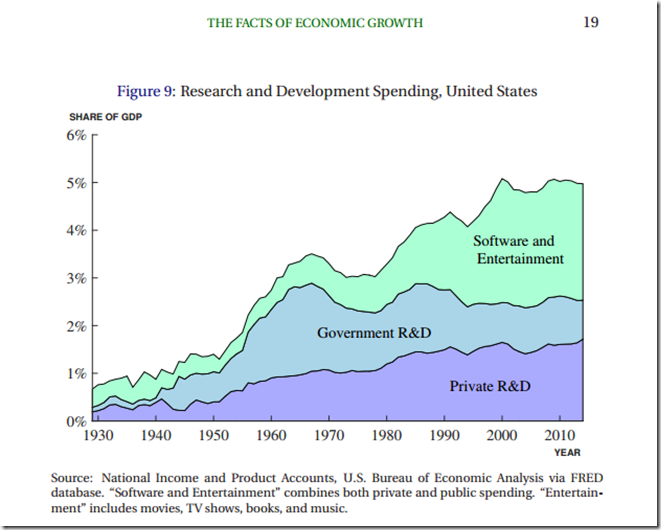Where Europe’s populations are growing (yellow) and declining
03 Dec 2015 Leave a comment
in population economics Tags: ageing society, demographic crisis, EU, Europe, Population demographics
If poverty could be solved by experts, we’d have solved it in 30s @HelenClarkUNDP
03 Dec 2015 Leave a comment
in constitutional political economy, development economics, economics of bureaucracy, growth disasters, growth miracles
@Oxfam what’s another name for a solar spill? @GreenpeaceUK
03 Dec 2015 Leave a comment
in energy economics, environmental economics, environmentalism
@350 @GreenpeaceUSA want to keep poor countries in energy poverty
03 Dec 2015 Leave a comment
in development economics, economic history, energy economics, environmentalism, growth miracles
50% more R&D since the 60s, but still no growth dividend?
03 Dec 2015 Leave a comment
in economics
Utopia, you are standing in it!
Spending on intellectual property products has risen in the USA from 1% in 1950 to 5% now. Public R&D spending in the USA has been pretty static for 60 years. Intellectual property products in the chart below includes traditional research and development, spending on computer software, and spending on entertainment such as movies, TV shows, books, and music. Spending on software and entertainment was only recently measured in the US national accounts. This inclusion of intangible capital investments will radically change the story of economic growth and the business cycle in the 20th century.
Source: Chad Jones (2015).
The growth rate in the USA hasn’t changed much despite this massive increase in intellectual property property product production. Is innovation getting harder? R&D is supposed to boost the growth rate, if you are to believe politicians bearing subsidies for it wherever they find it.
Source: Chad Jones (2015).
Ben Jones in
View original post 409 more words
12 ways ISIS gets funding
03 Dec 2015 Leave a comment
in defence economics, war and peace Tags: ISIS
Greg Mankiw on Fiscal Policy
03 Dec 2015 Leave a comment
in economics
I preface pretty much all my critiques of Greg Mankiw’s writings with a note on how good he has been to me. Some of my readers find this annoying. Yet, I think its important partially because I am a deep believer in academic civility and in part because making note of that fact is personally meaningful to me.
That having been said, I think Greg’s analysis is a bit off in his recent NYT column but most notably here.
The more we rely on deficit spending to keep the economy afloat, the more we risk the kind of sovereign debt crisis we have witnessed in Greece over the past year. The Standard & Poor’s downgrade of United States debt over the summer is a portent of what could lie ahead. In the long run, we have to pay our debts — or face dire consequences.
To be sure, the bond…
View original post 974 more words
What would be the opening offer of @jeremycorbyn at Syrian Civil War peace talks?
03 Dec 2015 Leave a comment
in defence economics, International law, war and peace Tags: British politics, Middle-East politics, Syrian Civil War
https://www.youtube.com/watch?v=h7M9NuiQXgs&feature=youtu.be
The best part of Hilary Benn’s speech when he explain the benefits of airstrikes. Benn pointed out that 14 months ago, ISIS was at the gates of Baghdad but airstrikes beat them back. Benn then referred to the Kurds where they were in retreat until there were airstrikes. They now have a border with ISIS they can defend.
Utopia, you are standing in it!
Exactly what would Jeremy Corbyn put on that negotiating table for a comprehensive peace settlement to the Syrian Civil War that:
- would end the military threat from ISIS in Syria, and
- allow the Kurdish succession opposed by all others plus Turkey, Iraq and Russia?
Without the resumption of military strikes as negotiating coin if such peace talks break down, why would anyone fighting on the ground in Syria care about what proposals the Western powers might put up?
The possibility of a temporary cessation in current and intensifying Western military airstrikes is one of the few reasons for the parties to sit down at a negotiating table with the Western powers and Russia if only to string out that cessation of those airstrikes while they regroup and re-equip. The parties to the Syrian Civil War only respect force, not moral authority.

The ability to negotiate a credible peaceful settlement between…
View original post 307 more words
Ginsburg & Wright on Behavioral Law and Economics: Its Origins, Fatal Flaws, and Implications for Liberty
03 Dec 2015 Leave a comment
in economics
My paper with Judge Douglas H. Ginsburg (D.C. Circuit; NYU Law), Behavioral Law & Economics: Its Origins, Fatal Flaws, and Implications for Liberty, is posted to SSRN and now published in the Northwestern Law Review.
Here is the abstract:
Behavioral economics combines economics and psychology to produce a body of evidence that individual choice behavior departs from that predicted by neoclassical economics in a number of decision-making situations. Emerging close on the heels of behavioral economics over the past thirty years has been the “behavioral law and economics” movement and its philosophical foundation — so-called “libertarian paternalism.” Even the least paternalistic version of behavioral law and economics makes two central claims about government regulation of seemingly irrational behavior: (1) the behavioral regulatory approach, by manipulating the way in which choices are framed for consumers, will increase welfare as measured by each individual’s own preferences and (2) a central…
View original post 129 more words
RAF sent Tornados and Typhoons into action from Akrotiri base in Cyprus within an hour of the vote result
03 Dec 2015 Leave a comment

The supply of facial hair over the centuries
03 Dec 2015 Leave a comment
in economic history, economics of media and culture Tags: fashions
"Frequencies in whisker forms" — a history of men's facial hair: thesocietypages.org/socimages/2015… http://t.co/PfDZSoVBtH—
(@SocImages) April 25, 2015
@cjsbishop @NZGreens Are fossil fuels a good investment? @GreenpeaceNZ @RusselNorman
03 Dec 2015 Leave a comment
in economic history, energy economics, environmental economics, environmentalism, financial economics
Cut drug lags with Free To Choose Medicine @annetterongotai @dbseymour @PeterDunneMP
03 Dec 2015 Leave a comment
in economics of regulation, health economics, politics - New Zealand, politics - USA, Sam Peltzman

Bart Madden and Vernon Smith outlined a brilliant proposal charted above to shorten lags in the availability of life-saving medicine based on reforms in Japan:
Recently, Japanese legislation has implemented the core FTCM [Free to Choose Medicine] principles of allowing not-yet-approved drugs to be sold after safety and early efficacy has been demonstrated; in addition, observational data gathered for up to seven years from initial launch will be used to determine if formal drug approval is granted. In order to address the pressing needs of an aging population, Japanese politicians have initially focused on regenerative medicine (stem cells, etc.).
Source: Give The FDA Some Competition With Free To Choose Medicine – Forbes via A Dual-Track Drug Approval Process.
This process would release the relevant data behind the drug including its clinical trials on a web portal so that patients and their doctors can work out whether a new drug is suitable to them given their genetic markers. Madden and Smith explain the operation of the web portal for Free to Choose Medicine (FTCM) as follows:
Doctors would be empowered to use their medical knowledge and in-depth knowledge of their patients similar to how they decide on off-label use for approved drugs, i.e., for uses that the FDA has neither tested nor approved but, in the opinion of doctors, are likely to be beneficial to patients. To gain early access, patients would purchase the drug from developers and consent to doctor and developer immunity from lawsuits except in the case of gross negligence or willful misconduct.
Off label use of medicines arises because the current Food and Drug Administration (FDA) process for drug approval has several phases. Phase 1 tests for the safety of the drug. Later phases are about whether the drug has its predicted effects. That should not be a concern of the FDA or its superfluous New Zealand equivalent Medsafe.
If a new drug isn’t better than the existing competition, that’s a problem for its investors for backing the wrong horse. It’s up to its investors and potential buyers to work out for themselves whether a new drug is more effective than the existing options. That’s a commercial decision, not a decision from regulators.
https://twitter.com/Carolynyjohnson/status/667696845615968257
Once a drug is approved by the FDA for particular uses, doctors and researchers often discover that a drug has other clinical applications.

Source: Pharma Marketing Blog
Rather than go through another round of FDA approvals, doctors simply prescribe that drug despite the fact it is not approved by the FDA for that particular clinical use. This is what is called off label prescription.
A number of US states have passed hopelessly unconstitutional Right to Try legislation that authorises the prescription of new drugs not approved by the FDA.
The Free to Choose Medicine proposal is similar to Right to Try legislation. Free to Choose Medicine would allow doctors to make their own prescription choices for their patients as long as the new drug has been shown to be safe. That is, it has passed Phase 1 of the FDA drug approval process. Phase 1 is about drug safety.
In 1962, an amended law gave the FDA authority to judge if a new drug produced the results for which it had been developed. Formerly, the FDA monitored only drug safety. It previously had only sixty days to decide this. Drug trials can now take up to 10 years.
https://twitter.com/MaxCRoser/status/627581135355310080
Sam Peltzman showed in a famous paper in 1973 that the 1962 amendments to US Federal drug approval laws reduced the introduction of effective new drugs in the USA from an average of forty-three annually in the decade before the 1962 amendments to sixteen annually in the ten years afterwards. No increase in drug safety was identified.
Peltzman found that the unregulated market quickly weeded out ineffective drugs prior to the 1962 law change in the USA. The sales of ineffective new drugs declined rapidly within a few months of their introduction.
Doctors stop prescribing medicines that don’t work. Patients complain quickly about medicines that don’t work. What matters is they had the chance to try this drug.
If economists have a bitter drinking song, a battle cry that unites the warring schools of economic thought all, it would be “how many people has the FDA killed today”. Many drugs became available years after they were on the market outside the USA because of drug approval lags at the FDA. The dead are many. To quote David Friedman:
In 1981… the FDA published a press release confessing to mass murder. That was not, of course, the way in which the release was worded; it was simply an announcement that the FDA had approved the use of timolol, a ß-blocker, to prevent recurrences of heart attacks. At the time timolol was approved, ß-blockers had been widely used outside the U.S. for over ten years. It was estimated that the use of timolol would save from seven thousand to ten thousand lives a year in the U.S. So the FDA, by forbidding the use of ß-blockers before 1981, was responsible for something close to a hundred thousand unnecessary deaths.
Free to Choose Medicine is an excellent way to break the regulatory deadlock over drug lags. Free to Choose Medicine should be adopted in New Zealand. Any new drug that has passed the phase 1 drug safety part of regulatory approval processes in any one of the USA, UK, Australia, Canada or Germany should be lawful to prescribe in New Zealand. New drugs should not have to go through the superfluous processes of Medsafe.
The existing drug regulatory regime is based upon making the drug safe for the average patient. That has been swept aside by pharmaceutical innovation as Madden and Smith explain:
Today’s world of accelerating medical advancements is ushering in an age of personalized medicine in which patients’ unique genetic makeup and biomarkers will increasingly lead to customized therapies in which samples are inherently small. This calls for a fast-learning, adaptable FTCM environment for generating new data.
In sharp contrast, the status quo FDA environment provides a yes/no approval decision based on statistical tests for an average patient, i.e., a one-size-fits-all drug approval process. In a FTCM environment, big data analytics would be used to analyze TEDD [Tradeoff Evaluation Drug Database] in general and, in particular, to discover subpopulations of patients who do extremely well or poorly from using a FTCM drug.








Recent Comments